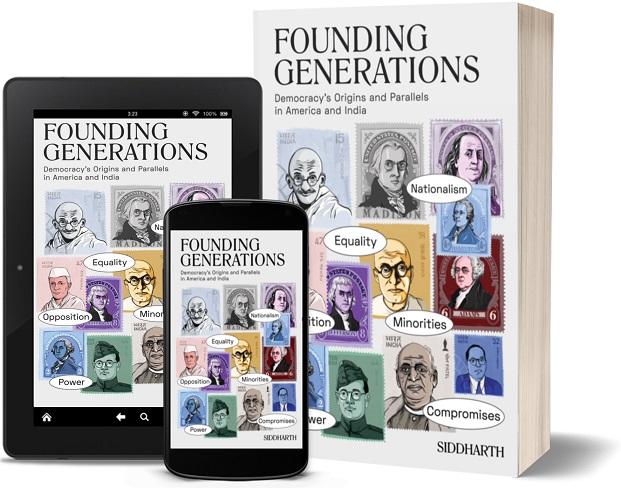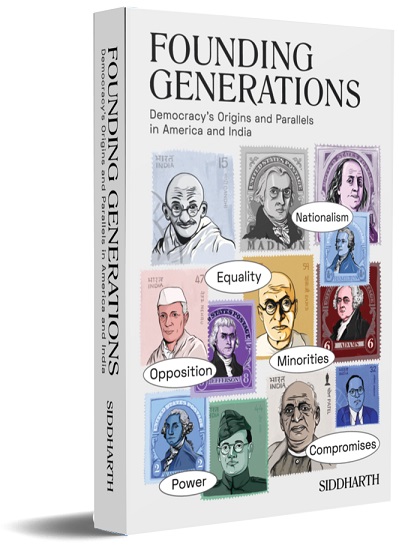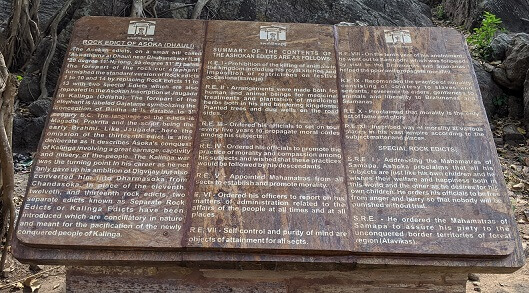In case you have still not grabbed a copy of my book Founding Generations for your next read, here are a few topics from the founding eras of Indian and American Democracies that have been discussed in the book. Hope this list would be interesting enough to inspire you. 🙂
Some Topics Concerning the Founding Era of India’s Democracy Discussed in the Founding Generations Book
Short biographies and contributions of the prominent leaders of the Indian Founding Generation—Mohandas Gandhi, Jawaharlal Nehru, Vallabhbhai Patel, C. Rajagopalachari, B. R. Ambedkar, and Subhas Bose.
The basis of providing SC/ST reservation in the first place and the roles played by Gandhi, Ambedkar, and Patel in the same.
The complex relationship between Gandhi and Ambedkar, both of whom were working simultaneously for the emancipation of the so-called Untouchables.
The major events that helped in Gandhi’s rise to power and his acute sense of wielding it astutely.
Rajaji’s contributions toward establishing a strong robust democratic opposition in India.
The impact of Nehru’s socialist policies and the Indo-China War of 1962 on governance.
The rise and fall of India’s first Free-market political party, the Swatantra Party, and how it temporarily pushed back Nehru’s socialist policies.
The complex relationship between Nehru and Patel, and how they subsumed their differences so that the newly-Independent India would not fall apart.
Nehru’s and Ambedkar’s forceful plea and activism for the passage of the Hindu Code Bill which reformed the Indian society and especially the status of women.
Nehru’s and Patel’s actions toward the abolition of the Zamindari System and redistribution of land to make India a more equal society.
The role played by Bose’s actions and his Indian National Army toward instituting a feeling of Nationalism that embraced all diversities.
Nehru’s response to the conundrum of linguistic states which for a time threatened the breakdown of India.
The neglect of Tribals and the inability of the founding generation in averting the Partition of India.
The various compromises made by the founding generation whose repercussions are still visible as failures in the Indian Democracy.
How each of the above themes—Minorities, Power, Opposition, Equality, Nationalism, Compromises—from those times are relevant in our present conundrums when we think about the Indian Democracy and its functioning.
Some Topics Concerning the Founding Era of America’s Democracy Discussed in the Founding Generations Book
Short biographies and contributions of the prominent leaders of the American Founding Generation—George Washington, John Adams, Thomas Jefferson, James Madison, Alexander Hamilton, and Benjamin Franklin.
Roles played by Jefferson, Madison, and Washington toward the protection of religious minorities in America.
Actions of the founding generation which led to the establishment of the world’s first secular state.
Washington’s acute sense of wielding power and how paradoxically surrendering power repeatedly brought to him even more of it.
The acerbic relationship between Hamilton and Jefferson-Madison duo that combined with the events in the 1790s established political Opposition and a two-party democratic system in America.
The big compromise of 1790 that led to the birth of the American financial powerhouse and how an uninhabited swamp became the just-born nation’s capital.
Adams’s views and his debate with Jefferson about the possibility of the rise of Economic Inequality in America of the future.
The roles played by Washington, Hamilton, and Adams in averting a disastrous war with Britain and France in the late 1790s, that would have almost surely stifled the rise of America.
Franklin’s transformation from being a colonist to an ardent supporter of America’s Independence and how that reflected the rising tide of Nationalism in America.
The role played by the Constitution and Washington as the president in instituting Nationalism amongst the masses in America.
The pathetic views and mostly prejudiced actions of the founding generation toward African Americans who were usually considered subhuman.
The Louisiana Purchase and how it more than doubled America’s territory at the stroke of a pen.
The disastrous policies instituted by the founding generation that ultimately led to the decimation of the Native American culture and cost the lives of millions.
The various compromises made by the founding generation whose repercussions are still visible as failures in the American Democracy.
How each of the above themes—Minorities, Power, Opposition, Equality, Nationalism, Compromises—from those times are relevant in our present conundrums when we think about the American Democracy and its functioning.
You can order the book by clicking here.

 Easter Eggs 🥚🥚🥚🥚 Hidden in the Book's Cover
Easter Eggs 🥚🥚🥚🥚 Hidden in the Book's Cover